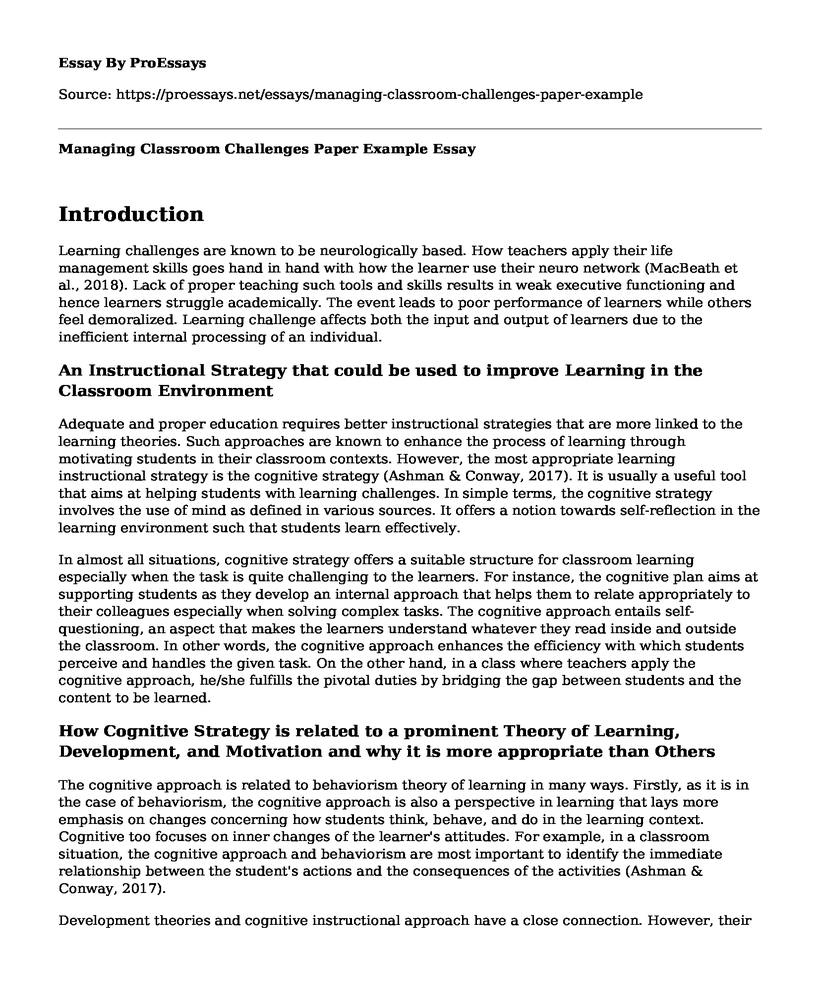Introduction
Learning challenges are known to be neurologically based. How teachers apply their life management skills goes hand in hand with how the learner use their neuro network (MacBeath et al., 2018). Lack of proper teaching such tools and skills results in weak executive functioning and hence learners struggle academically. The event leads to poor performance of learners while others feel demoralized. Learning challenge affects both the input and output of learners due to the inefficient internal processing of an individual.
An Instructional Strategy that could be used to improve Learning in the Classroom Environment
Adequate and proper education requires better instructional strategies that are more linked to the learning theories. Such approaches are known to enhance the process of learning through motivating students in their classroom contexts. However, the most appropriate learning instructional strategy is the cognitive strategy (Ashman & Conway, 2017). It is usually a useful tool that aims at helping students with learning challenges. In simple terms, the cognitive strategy involves the use of mind as defined in various sources. It offers a notion towards self-reflection in the learning environment such that students learn effectively.
In almost all situations, cognitive strategy offers a suitable structure for classroom learning especially when the task is quite challenging to the learners. For instance, the cognitive plan aims at supporting students as they develop an internal approach that helps them to relate appropriately to their colleagues especially when solving complex tasks. The cognitive approach entails self-questioning, an aspect that makes the learners understand whatever they read inside and outside the classroom. In other words, the cognitive approach enhances the efficiency with which students perceive and handles the given task. On the other hand, in a class where teachers apply the cognitive approach, he/she fulfills the pivotal duties by bridging the gap between students and the content to be learned.
How Cognitive Strategy is related to a prominent Theory of Learning, Development, and Motivation and why it is more appropriate than Others
The cognitive approach is related to behaviorism theory of learning in many ways. Firstly, as it is in the case of behaviorism, the cognitive approach is also a perspective in learning that lays more emphasis on changes concerning how students think, behave, and do in the learning context. Cognitive too focuses on inner changes of the learner's attitudes. For example, in a classroom situation, the cognitive approach and behaviorism are most important to identify the immediate relationship between the student's actions and the consequences of the activities (Ashman & Conway, 2017).
Development theories and cognitive instructional approach have a close connection. However, their relationship aims at improving the performance of the learners. For instance, the modernization theory of development helps the teachers to identify which learners are beneficial and who constitute the obstacles to learning (Lin-Siegler, Dweck & Cohen, 2016). The idea concentrates at balancing the weak students with the bright learners. Maslow's hierarchy of needs being a motivation theory has a significant relationship with the cognitive approach. For instance, it enables learners to understand what they exactly want to do and what they need to achieve. The approach tends to control the behavior of students. Therefore, due to its effectiveness in enabling successful learning in a classroom, cognitive instructional approach emerges as the best than any other method.
How to assess the Effectiveness of Cognitive Instructional Strategy and why the Assessment is Appropriate to the Learning Context
There are several ways of evaluating the efficacy of a cognitive approach to learning. In several cases, observation is termed as the most appropriate. Here, the teacher will have to establish a close relationship with their learners to observe their behaviors. Most importantly, the teacher needs to involve the learners in the so-called student practices to monitor their skills after leaning has taken place. The importance of the assessment is to enable teachers to impart better teaching methods in the classrooms (Oxford, 2016). Also, evaluation of the cognitive approach will help students to realize their potential and learn how better they can adjust their behaviors towards becoming successful in life.
Conclusion
In conclusion, learning as a process is perceived to have several challenges. The emerging problems impact the class I the sense that it hinders proper learning. Improper learning might result in poor performances and demoralization among the students and teachers. Therefore, there is a need to establish an appropriate instructional that serves to improve the entire classroom learning. However, to ensure the approach satisfies the demands of the learners, a continuous assessment is always advisable.
References
Ashman, A. F., & Conway, R. N. (2017). Using cognitive methods in the classroom. Routledge.
Lin-Siegler, X., Dweck, C. S., & Cohen, G. L. (2016). Instructional interventions that motivate classroom learning. Journal of Educational Psychology, 108(3), 295.
MacBeath, J., Dempster, N., Frost, D., Johnson, G., & Swaffield, S. (2018). Strengthening the Connections Between Leadership and Learning: Challenges to Policy, School, and Classroom Practices. Routledge.
Oxford, R. L. (2016). Teaching and researching language learning strategies: Self-regulation in context. Routledge.
Cite this page
Managing Classroom Challenges Paper Example. (2022, Jul 03). Retrieved from https://proessays.net/essays/managing-classroom-challenges-paper-example
If you are the original author of this essay and no longer wish to have it published on the ProEssays website, please click below to request its removal:
- Dissrtation Methodology on Company's Organisational Culture
- Compare and Contrast Essay on Homeschooling vs. Public Schooling
- Technology Business Implications Essay Example
- New Insights Gained Based on Results of The "Locus of Control" Assessment
- Analyzing Elements of Demagoguery in Kim Jong Un's New Year Speech Essay
- Cultural Adaption: Essential for Leadership in Global Contexts - Essay Sample
- No Child Left Behind Legislation - Essay Sample







